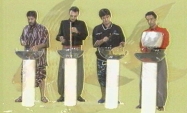
Formado no ano de 1978 sob liderança de Marco Antônio Guimarães, discípulo do suíço Walter Smetak, o grupo Uakti tirou seu nome de uma lenda indígena dos índios Tukano, do Alto Rio Negro. Sua música caracteriza-se pela instrumentação original. Os músicos (Marco Antônio Guimarães, cordas; Paulo Sérgio dos Santos, percussões; Artur Andrés Ribeiro, sopros; Décio de Souza Ramos, percussões) são os construtores/adaptadores de seus instrumentos, feitos de materiais como tubos de PVC, sinos de madeira, caldeirões etc. Além disso, usam instrumentos "convencionais" como violões e violoncelos. O grupo participou de discos de Milton Nascimento, que produziu o primeiro trabalho, “Uakti - Oficina Instrumental”, em 1981. O segundo LP do grupo, Uakti II, foi lançado em 1982 pela Ariola-Barclay, e marca o início da utilização da marimba d’Angelim, que viria a se tornar, a partir de então, elemento musical de extrema importância na instrumentação do grupo. Tudo e Todas as Coisas, disco de 1984, representa uma nova fase do grupo, com mais ênfase na pesquisa da improvisação e da utilização de novos instrumentos como a marimba de vidro e o aqualung, que utiliza o som da água como matéria sonora. Famosos no exterior, lançaram outros discos: I Ching, Mapa, Trilobyte, Águas da Amazônia.